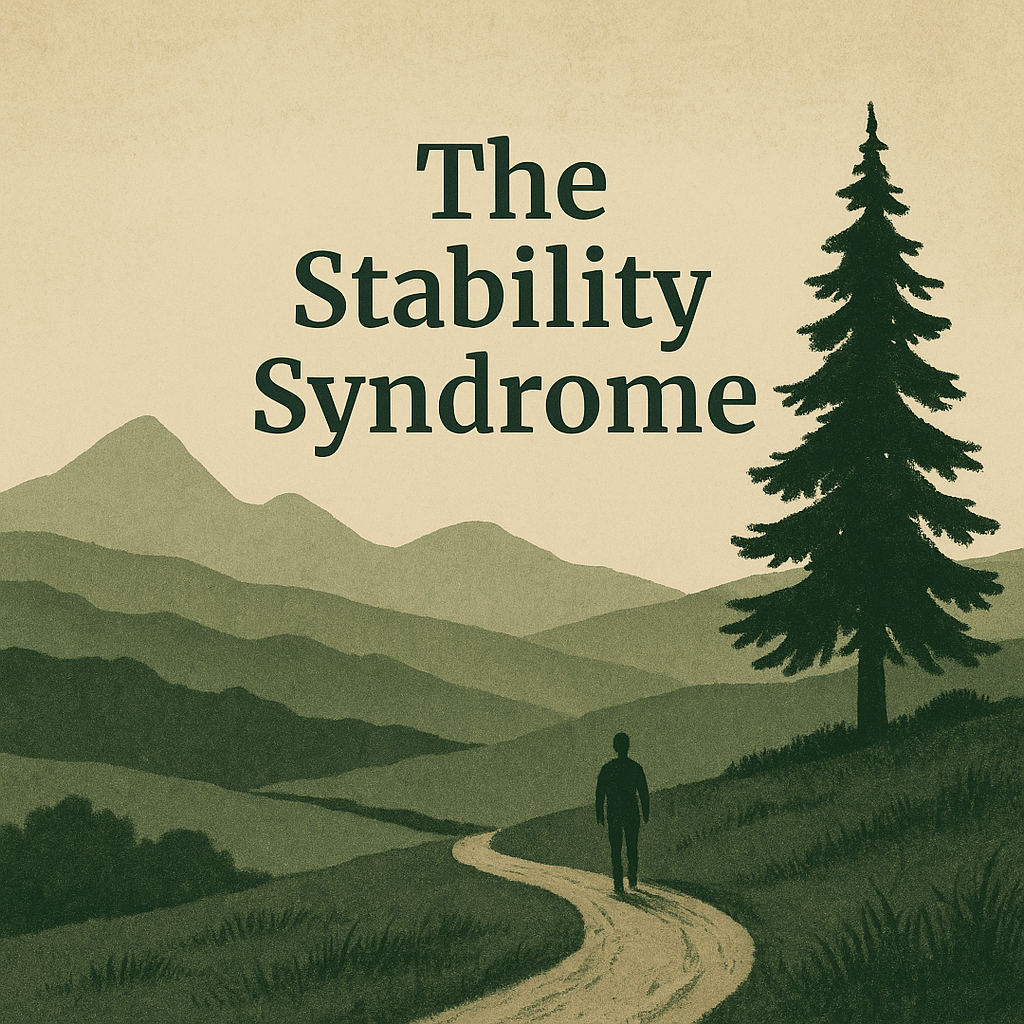When fear disguises itself as wisdom
We speak often about change, who wants it, who resists it, and what it costs.
But rarely do we ask what makes some people fear change so deeply, even when it seems necessary.
Why are some drawn to conserve at all costs, not just institutions or traditions, but entire worldviews?
The answer, I think, lies in something more basic than belief.
It lies in instinct, in the deep, often unconscious drive to protect what is known, even if it no longer serves us.
This is what I’m calling the stability syndrome: the tendency to treat what is familiar as what is good, and what is stable as what is true.
It’s not always a political position. It’s a psychological reflex. And when it becomes ideology, it can be deeply resistant to reason.
What Conservatism Gets Right
Let’s start with what’s defensible.
Not all resistance to change is wrong.
Tradition holds real wisdom. Institutions carry hard-won lessons.
Sometimes the past isn’t regressive, it’s protective.
Conservatism at its best is cautious, grounded, and aware of how quickly progress can turn into chaos.
But at its worst, it’s something else entirely.
Not wisdom — but fear masquerading as wisdom.
Not tradition — but paralysis.
Not principle — but instinct dressed up as morality.
This is the stability syndrome: the belief that if we just keep things as they are, we will be safe. That movement is threat. That newness is decay. That control is peace.
Fear, Disguised as Common Sense
What’s called “common sense” is often just familiar instinct, inherited, emotional, and unexamined.
It’s the part of the mind that says:
- People used to know their place.
- The world was better before.
- Change is dangerous.
- We need to go back.
This doesn’t come from rational analysis. It comes from a sense of threat.
And when fear takes the wheel, ideology gets built not on what’s just but on what’s comforting.
It tells us:
- Order is always good
- Hierarchies are natural
- The unfamiliar is unsafe
That’s not conservatism as thought it’s conservatism as survival reflex.
The Deep Roots of the Reflex
There’s a reason these reactions are powerful. They’re not just political they’re biological.
In human evolution, the unknown was dangerous. The stranger could be a threat. The tribe was safety. Rules, roles, and repetition meant survival.
Our Id — our base instinctual self — evolved to prioritise security, predictability, and caution. These impulses didn’t just keep us alive; they shaped culture.
Over generations, those survival responses became encoded in social norms — passed down through language, stories, law, and family.
They became the bones of the superego, the internalised “shoulds” that shape how we behave.
But here’s the tension: the world has changed faster than those instincts.
We live in complex, pluralistic, interconnected societies where old tribal instincts no longer serve us.
What was once adaptive can now be harmful.
We still fear the stranger but today, the “stranger” is no longer someone outside the tribe or from the next valley over.
Now, the stranger is your neighbour, your colleague, your shopkeeper.
Think about it: a hundred years ago, you would likely have known the people who lived on your street, worked in your town, or sold you bread by name. You would have known their children, their values, their patterns.
Now, we live among people we recognise but do not really know.
This constant exposure to difference without relationship wears on us. It creates a low-level unease. And for many, conservatism becomes a kind of reaction not to real danger, but to perceived disconnection.
It's not hatred. It's disorientation.
And in that disorientation, the instinct is to tighten the boundaries. To build walls physical, ideological, cultural in hopes that safety will feel like it used to. But it rarely does.
Because it’s not just that the world has changed.
It’s that our old instincts no longer fit the world we’re in.
All Things Shining — and the Loss of Place
In All Things Shining, Hubert Dreyfus and Sean Dorrance Kelly describe the modern condition as a kind of crisis of meaning. In the ancient world, people knew their place their role in the cosmos, in society, in religion. Life was infused with significance.
Now, we are radically free and utterly disoriented.
This is part of the stability syndrome too: it’s not just about safety. It’s about belonging.
We long to know where we stand, who we are, what we’re for. And in the absence of shared meaning, we retreat into what feels fixed heritage, tradition, identity.
But this retreat rarely works.
Because you cannot rebuild meaning by clinging to the past.
And you cannot rediscover place (or build a new place) by excluding others.
We need new frameworks for orientation not a return to the old ones.
When Stability Becomes Idolatry
There’s nothing wrong with valuing stability.
But there is something deeply wrong with worshipping it.
Because not all that is stable is good.
Abuse can be stable. Inequality can be stable. Silence can be stable.
The danger is when stability becomes the highest value when we protect systems simply because they are there.
When the desire to keep things in place becomes stronger than the desire to make things right, we begin to lose sight of what we’re defending.
This is when stability syndrome turns from caution to complicity.
What Are We Really Protecting?
This is the question that haunts much of the modern right:
What are we really conserving?
If your instinct is to preserve family, nation, gender roles, religious values, or “the natural order” you must ask:
Are these structures serving people now? Or are they serving only themselves?
Reason
If you cannot tell the difference between preservation and protectionism, you are no longer defending virtue.
You’re just defending the status quo.
The Other Side of the Coin
In The Progressive Paradox, I explored how movements for justice can become dogmatic how the left risks becoming what it tries to resist.
But the right has its own trap.
If the left sins through overreach, the right sins through stagnation.
If the left loses its soul in pursuit of utopia, the right risks never waking up at all.
One builds too quickly. The other refuses to build at all.
Both confuse conviction with certainty.
Both struggle to hold nuance.
The Call to Courage
True conservatism, like true progressivism requires courage.
Not the courage to hold your ground.
But the courage to ask whether the ground is still worth standing on.
Not the strength to resist change blindly.
But the strength to examine why you fear it.
Because safety is not the same as goodness.
And silence is not the same as peace.
The stability syndrome tells us that what we know is what is right.
But reason and history demand more.
Sometimes, what’s most dangerous isn’t the threat of change.
It’s the refusal to grow.
Good > Stability
This post contains affiliate links. If you buy something through them, I may earn a small commission at no extra cost to you.

